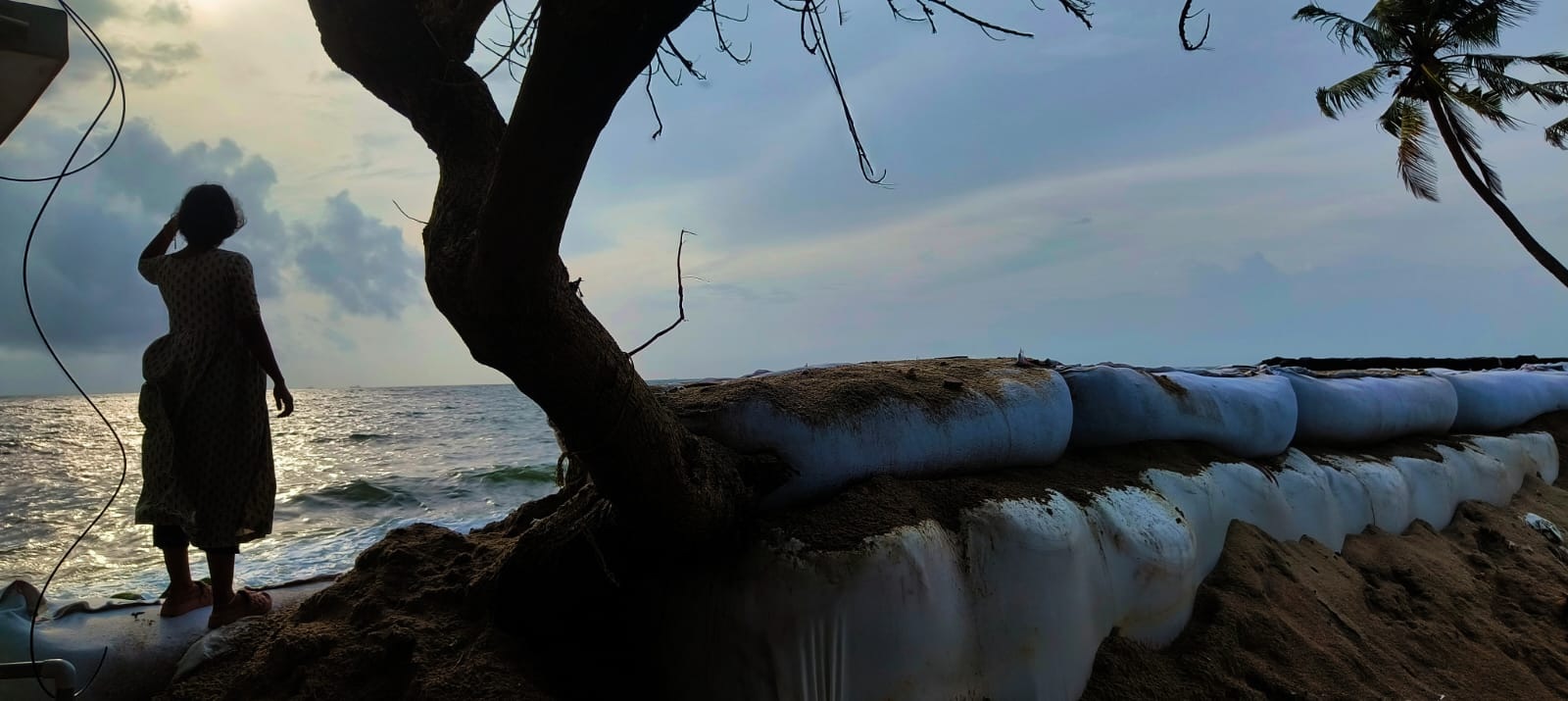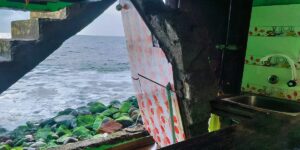Published Sep 12, 2024 | 9:00 AM ⚊ Updated Oct 10, 2024 | 9:25 PM

For the people of Cheriyakadavu, Chellanam, the suffering did not begin yesterday or the day before. (Sreelakshmi Soman/ South First)
A 28-day-old baby lays fast asleep beside her mother Neha blissfully unaware of the brewing storm outside. Neha’s mother Manju had been especially vigilant that stormy day. The rain was relentless, and a sense of unease hung in the air. The sky seemed angrier than usual, and the sea roared louder than ever before.
Suddenly, a cold splash of water hit the baby’s delicate face, dripping from the ceiling above. It was then they realised that the sea — the same sea that had sustained them for generations — was about to swallow them whole.
In panic, Manju grabbed her daughter and grandchild, rushing them out of their home, and seeking refuge in a neighbour’s house. They barely made it out in time. Within moments, the powerful waves crashed into their small home, reducing it to rubble.

Manju Sony’s home, which was destroyed by sea incursion in the last week of August. (Sreelakshmi Soman/ South First)
The house had been a gift — a blessing bestowed upon them eight years ago by the legendary singer Yesudas, constructed by a charity organisation with the help of a prominent print media group in Kerala. It had been their safe haven, their pride. Now, it was gone.
Generations ago, their ancestors would walk two to three kilometres to bathe in the sea, drawing life from its abundant fish and treasures. The sea had always been their friend, their provider. But now, it had turned into a nightmare for the present generation — a monstrous force that threatened to consume everything they held dear.
For the people of Cheriyakadavu in Chellanam, the suffering did not begin yesterday or the day before. It is a saga of decades of broken promises, unheard cries, and unending struggles.
More than 2,000 families are directly impacted, trapped in a relentless battle against nature and neglect. Their plight has fueled a protest that has stretched on for 1,780 days of fighting for survival, for justice, and for the right to simply exist.
As Manju narrates her ordeal to South First, the baby plays joyfully in her safe embrace. The family is currently staying in a rented house in Manasserry, kindly offered to them for free by a generous soul for three months.
Manju, the wife of Ettukandathil Sony, along with her three daughters, Neha, Sinta, and Aleena, and a grandchild have no place to go once this temporary shelter ends. They have only the clothes they are wearing; everything else was swallowed by the sea.
Chellanam Janakeeya Vedi, a people’s forum led by Advocate Thushar Nirmal Saradhi, Suja Bharathy, and VT Sebastian, is at the forefront of educating the public and leading protests to save the coastal region of Chellanam. According to Suja Bharathy, while they do not directly blame the Cochin Port for the current sea incursion in Cochin’s coastal areas, the port’s activities have played a significant role in worsening the situation. The solution to this problem, she insists, also lies with the Cochin Port.
“The key to saving our coast is in their hands,” she said. “By depositing soil and dredging material into the coastal areas, the water depth can be reduced, which would help soften the impact of the tides.” She highlighted that a few weeks ago, they had a meeting with the Ernakulam Collector, Cochin Port authorities, and irrigation officials to raise these concerns, emphasizing that the solution is clear and actionable.
However, she criticized the government’s approach of implementing only temporary measures. “The current tetrapod installation covers just 7.5 kilometers, leaving 10 kilometers of the coast still vulnerable. There is an urgent need to restore our coastal areas, or else the aggressive sea incursion will eventually wipe out the fishing community of Cheriyakadavu and nearby areas,” she warned.
“Residents have been urging the authorities to fortify the entire 20-km stretch of coastline between Chellanam and Fort Kochi with groynes and tetrapod walls to combat erosion,” Sebastian told South First. Several houses in Cheriyakadavu, located within the Chellanam panchayat, are experiencing flooding due to inadequate coastal protection.
Sebastian highlighted that the Cheriyakadavu section lacks any form of coastal defence, such as sand embankments, leaving it vulnerable to encroachments from the sea during adverse weather conditions.
Shaji Arakkal, a resident of Cheriyakadavu, expressed his frustration to South First, saying, “The authorities consistently fail to provide adequate warnings. The panchayat’s response is to bring sand-filled bags, which have become a routine after every disaster, but this is not a long-term solution. People often question why we don’t leave, but where would we go? I am a fisherman, and this is the only job I know. How can I support my family if I leave?”
The government introduced the Punargeham project, but it’s unrealistic to expect families to buy land and build a house with just ₹10 lakh. According to the scheme, ₹6 lakh is allocated for purchasing land and ₹4 lakh for construction. Additionally, if the house isn’t completed within 12 months of receiving the first instalment of financial aid, families must repay the government with an 18% interest rate. “This feels like setting us up for a debt trap instead of providing real support,” he added.
Teroshi Shaji, a resident of Cheriyakadavu in Chellanam, has expressed deep frustration over the ongoing issues faced by her community. She shared with South First that despite the widespread attention on the Wayanad landslide tragedy, their own struggles, primarily due to sea incursion, are largely overlooked.
Teroshi pointed out that many in their fishermen’s community lack sufficient education and awareness. Recently, government representatives approached them to sign various documents, some of which turned out to be significant agreements related to the Punargeham project. Teroshi and her neighbours, who signed these documents without fully understanding their implications, now accuse the authorities of deceit. She firmly stated, “We refuse to leave our land. We want to stay here.”
“Relief camps are not a permanent solution. We are committed to fighting for our land. Recently, many of us were charged by the police for protesting near Cochin Port Road. Our children are not involved in fishing, and even the older generation deserves to live with dignity. This area is backward—there are no libraries, cinemas, or petrol pumps. While MLAs, MPs, and other officials often visit and make promises, nothing ever gets implemented. We come here every evening to protest and will not leave until we secure a permanent solution that allows us to sleep peacefully,” Jossy Jose told South First.
Nixon George and Shimla Jossy, members of the panchayat, informed South First that the issues at hand could not be resolved at the panchayat level. Nixon George stated, “The central government needs to allocate more funds to complete the project. We are doing our utmost for the people, but many refuse to stay at relief camps, even temporarily. We provide assistance and proper alerts, and we have a WhatsApp group for each ward.”
Shimla Jossy added that, in her area, sea incursion has decreased, and she is hopeful that the project will be completed soon. She emphasized that the matters related to Cochin Port need to be addressed by higher authorities.

